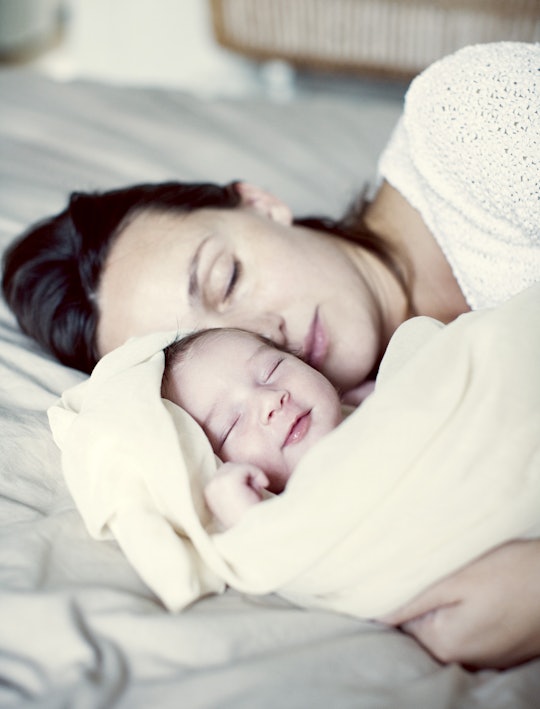There's a lot of controversy out there about bed-sharing, and many parents struggle to make the right decision for their family when it comes to sleep arrangements. But even if you do your homework, you'll find that there are some myths about bed-sharing that are putting babies in danger — it's more than just laying your baby in bed between you and your SO.
According to the American Academy of Pediatrics, bed-sharing is still the greatest risk factor for sleep-related infant deaths, so why is it still considered safe by some experts? Because there is a right and wrong way to do it. There are too many deaths that could be prevented, if only there had been some education on how to safely bed-share. Dr. James McKenna, director of the Mother-Baby Behavioral Sleep Laboratory at University of Notre Dame, noted that there are very specific guidelines that should be followed to ensure your baby is safe while bed-sharing — they have to be lying on their backs, on a firm surface, without secondhand smoke, and their heads should be uncovered. You can't just bring your baby into your super soft waterbed, full of pillows and blankets, and prop them up with a bottle. That's not how safe bed-sharing works, despite the myths that perpetuate these ideas.
Bed-sharing is natural, but it takes a little effort to make it a safe choice for your baby. And that effort starts with forgetting all about these nine myths about bed-sharing that are putting babies in danger.
Myth #1: You Can Bed-Share At Any Time
According to McKenna, any drugs, alcohol, or desensitizing medication should be avoided when you bed-share. If you come home drunk from a night out, your baby needs to sleep on a surface separate from you. It's too risky to bed-share when you're impaired as your chances of arousing if your baby needs you are lowered, and you're not fully aware of your own position in the bed.
Myth #2: Swaddles & Baby Blankets Are OK
Nope. Although swaddling is often recommended for babies, it's not OK to swaddle your baby if you're going to bed-share. Kelly Mom noted that swaddles not only overheat your baby, but your little one can't free their arms or legs to move blankets or alert you to something being wrong.
Myth #3: Your Position Doesn't Matter
Many assume that bed-sharing is safe because you're near your baby, but where you sleep matters. According to Kelly Mom, there's reason to believe the baby is safest when sleeping near the breastfeeding parent and the Mother-Baby Behavioral Sleep Laboratory at University of Notre Dame recommended that the breastfeeding parent should sleep on their side, facing their baby, with baby under their arm.
Myth #4: Family Beds Are Safe
A family bed sounds nice and cozy, but it's not exactly conducive to safe bed-sharing with a baby. The Mother-Baby Behavioral Sleep Laboratory at University of Notre Dame noted that having older children in the bed with a baby is not safe — your other children do not have the ability to stay alert with a baby in the bed, nor are they responsible for the safety of the baby like you are.
Myth #5: Bottle-Fed Babies Are Just As Safe As Breastfed Babies
Although there is nothing wrong with choosing to bottle feed your baby, there is a decreased safety risk when it comes to bed-sharing with a bottle fed baby versus a breastfed baby. Part of the safety in bed-sharing is relying on a baby being breastfed, noted The Huffington Post. Breastfeeding babies and mothers have a connection and instinctive behavior that follows the safe guidelines for bed-sharing. But bottle fed babies don't have the same instincts. McKenna noted that bottle fed babies (and their mothers) generally sleep deeper than breastfed babies, making it more difficult for them to arouse from sleep if something is wrong. He also suggested that bottle fed babies are often placed in unsafe sleeping positions because the mother is not exercising the instinctive breastfeeding position and instead relies on pillows or placing the baby higher on the bed to bottle feed.
Myth #6: You Can Bed-Share If You're Exhausted
If bed-sharing is a way for you to get more sleep, then it's safe to pass out next to your baby when you're incredibly exhausted, right? Not so much. Like being impaired by alcohol or medication, exhaustion can impair your ability to arouse yourself from sleep and can decrease your alertness, noted Kelly Mom. If you're so tired you don't think you can remain alert enough to bed-share with your baby, then you'll want to wait for a night when you aren't so overly tired.
Myth #7: You Can Bed-Share In Any Bed
Nope. If your bed is in a room that has been smoked in, is a water bed or other soft surface, or full of pillows and blankets, it's not safe to bed-share in. Dr. Sears noted that a soft bed is just as dangerous for a baby to sleep on as a soft crib mattress and McKenna recommended that bed-sharing should be avoided if the mother smokes as this is a risk for SIDS.
Myth #8: Your Partner Doesn't Have To Agree With Bed-Sharing
Except they totally do. Both parents should be on board with bed-sharing and both should feel responsible for the well-being of the baby, according to McKenna. Your partner should be just as educated and committed as you are to bed sharing so your little one is safe.
Myth #9: Babies Can Sleep On Their Tummy If They Are Bed-Sharing
Nope. Your baby still needs to sleep flat on their back, even while bed-sharing, noted Kelly Mom. This is the safest position for your baby and can help reduce the risk of SIDS.
